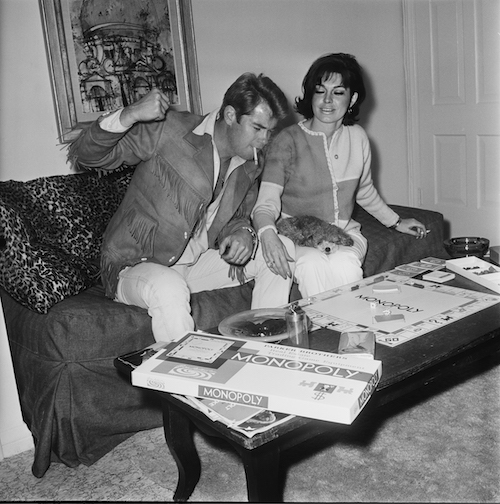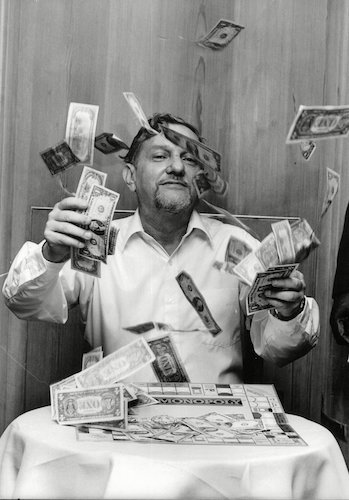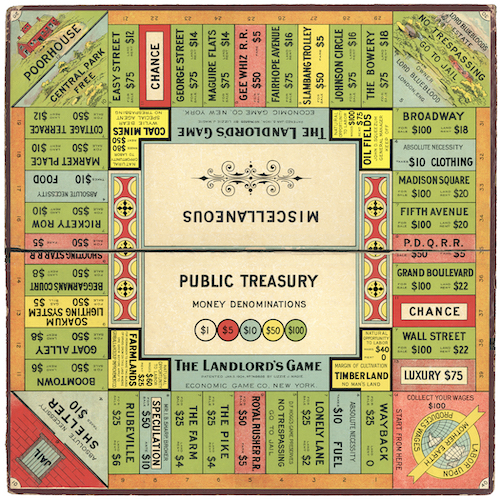Communiqué
Part detective story and part pop culture commentary, “Ruthless: Monopoly’s Secret History” on AMERICAN EXPERIENCE , Feb. 20 at 9 pm
< < Back toAmerican Experience Ruthless: Monopoly’s Secret History
Premieres Monday, February 20, 2023, on PBS and Streaming on PBS.org
The Real Story Behind America’s Most Popular Board Game
February 20 at 9:00 pm
For generations, Monopoly has been America’s favorite board game, a love letter to unbridled capitalism and — for better or worse — the impulses that make our free-market society tick. But behind the myth of the game’s creation is an untold tale of theft, obsession and corporate double-dealing. Part detective story, part sharp social commentary and part pop-culture celebration, Ruthless: Monopoly’s Secret History presents the fascinating true story behind America’s favorite game. Written and Directed by Stephen Ives and Executive Produced by Cameo George, Ruthless: Monopoly’s Secret History premieres Monday, February 20, 2023, 9:00-10:00 p.m. on PBS, PBS.org and the PBS App.

Few rituals are as all-American as a game of Monopoly. Its iconic board and game pieces — from the diminutive robber baron Rich Uncle Pennybags to the Get Out of Jail Free card to the tiny thimble and top hat — are instantly recognizable. It is an exhilarating game of no-holds-barred competition and brutal domination of your opponents, a celebration of greed and accumulation of wealth with only one player standing at the end. It may be only a game, but the popularity of Monopoly speaks volumes about who we are and what we value.
Contrary to the folksy legend spread by Parker Brothers, Monopoly’s secret history is a surprising saga that features a radical feminist, a community of Quakers in Atlantic City, America’s greatest game company, and an unemployed Depression-era engineer. According to the official origin story, during the Great Depression, an amateur inventor named Charles Darrow sketched out the now-famous Monopoly board on a piece of oilcloth on his kitchen table. His game became a best-seller, Darrow became a wealthy man, and Parker Brothers was saved from bankruptcy. It was a classic American success story. But it wasn’t true. The real story behind the creation of the game might never have come to light if it weren’t for the determination of an economics professor and impassioned anti-monopolist named Ralph Anspach.

Photo by Monty Fresco/ANL/Shutterstock (5832096a)
Fed up with the OPEC oil cartels and gas shortages in the 1970s, Anspach created “Anti-Monopoly,” which retained the fun of the original game but made it clear that the monopolists were the bad guys. General Mills, which now owned Parker Brothers, was not amused and sued Anspach, ordering that he cease and desist selling his game. As part of his defense strategy, Ralph sought to prove that the Monopoly trademark was dubious and investigated the game’s early history before it was acquired by Parker Brothers. The ensuing investigation and David vs. Goliath legal battle would consume Ralph’s life for over a decade.
Anspach discovered that the game was invented in 1904 by Lizzie Magie, a feminist, actor, poet, engineer, and follower of the radical economic theories of the influential writer and public speaker Henry George. George believed that a single tax on land would reduce inequality and promote a more just society. Magie hoped to promote George’s ideas through the power of game, and she invented “The Landlord’s Game,” which was designed to illustrate the evils of landlords and monopolistic practices. Magie’s creation spread first on college campuses, with players across the country making their own boards. The game found its way to a community of Quakers in Atlantic City who added local street names — like Oriental Avenue, Marvin Gardens and, of course, Park Place and Boardwalk — to their boards. Decades later, when a Quaker couple invited their friends Charles Darrow and his wife to play the game, the unemployed Darrow saw a way out of his Depression-era woes. He asked his host to make him a replica of the board and type up the rules, then he began producing and marketing it himself. In 1935, Darrow sold his “invention” to the struggling Parker Brothers.

As Monopoly’s popularity exploded, Parker Brothers embarked on a frantic effort to cover up the fact that their best-selling game was, in fact, in the public domain. For some reason, the U.S. Patent Office granted Darrow a patent on his version of the game, even though the Landlord’s Game was clearly its progenitor. Parker Brothers then sought to buy off Lizzie Magie by promising to publish two of her other games. The company then set out to monopolize Monopoly – acquiring and destroying old folk versions of the game. Parker Brothers managed to keep their secret for decades, racking up hundreds of millions of dollars in profits. Ralph Anspach’s lonely crusade would take him to the brink of bankruptcy and all the way to the U.S. Supreme Court, where he would finally be vindicated. The fascinating origin story of America’s favorite game was brought to light. Ruthless: Monopoly’s Secret History celebrates America’s complicated relationship with its favorite board game, and gives credit to Lizzie Magie, one of the most creative and outspoken women of the early twentieth century.
American Experience Ruthless: Monopoly’s Secret History will stream simultaneously with broadcast on all station-branded PBS platforms, including PBS.org and the PBS App, available on iOS, Android, Roku, Apple TV, Amazon Fire TV, Android TV, Samsung Smart TV, Chromecast and VIZIO. All titles will also be available for streaming with closed captioning in English and Spanish.

